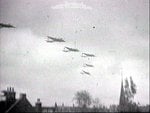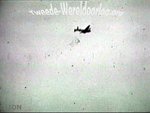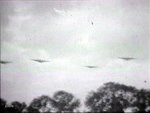With all the destruction the bombing caused, in the Netherlands the heavies are still remembered as live savers. This is because of operation manna, which started on April 29th 1945.
The fact that the northern part of the Netherlands was not liberated after the failure of Market Garden had severe consequences for the big cities in Western Netherlands. As revenge for the rail road strike in 1944, German authorities prevented all food transport to western Holland. The cites entered the worst winter of the war, called the Hunger winter. Hardly any food or fuel was available. Trees were cut down, to be burned for heat and many people, mainly women travelled hundred of kilometres on bike to get some food from the farmers in the eastern part of the country.
After months of negotiations, the german authorities allowed te alles to help these people by dropping supplies from the air. On april 29th, 1945, hundreds of Lancaster bombers dropped 535 tonns of food and supplies, later joined by the B17's of the USAAF. The Germans agreed not to fire on the a/c, although some minor incidents occured, mainly with light weapons. In total 11000 tonns of supplies were dropped during 8 days by 30 RAF and 11 USAAF squadrons. After those 8 days, the German army had surrendered and supplies could be transported in other ways to the hungry dutch.
The fact that the northern part of the Netherlands was not liberated after the failure of Market Garden had severe consequences for the big cities in Western Netherlands. As revenge for the rail road strike in 1944, German authorities prevented all food transport to western Holland. The cites entered the worst winter of the war, called the Hunger winter. Hardly any food or fuel was available. Trees were cut down, to be burned for heat and many people, mainly women travelled hundred of kilometres on bike to get some food from the farmers in the eastern part of the country.
After months of negotiations, the german authorities allowed te alles to help these people by dropping supplies from the air. On april 29th, 1945, hundreds of Lancaster bombers dropped 535 tonns of food and supplies, later joined by the B17's of the USAAF. The Germans agreed not to fire on the a/c, although some minor incidents occured, mainly with light weapons. In total 11000 tonns of supplies were dropped during 8 days by 30 RAF and 11 USAAF squadrons. After those 8 days, the German army had surrendered and supplies could be transported in other ways to the hungry dutch.





